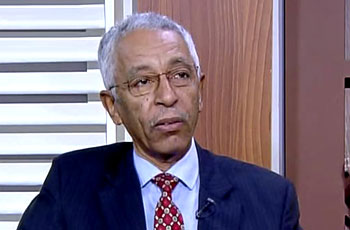Submitting to Dictates is Not an Option

Dr. Khidr Haroun Ahmed
Opinions have varied between supporters and opponents of the Sudanese government’s decision not to participate in the Geneva meetings held for a week to discuss the humanitarian aspects resulting from the ongoing war in Sudan for more than a year. The following are the perspectives of the author of these lines on the matter.
Firstly, no sane person with an understanding of international relations would advocate antagonizing the United States of America. It is still the most powerful actor on the international stage, despite the emergence of other powers that are likely to continue rising in the coming decades and years, potentially creating a multipolar world that allows weaker nations to maneuver and explore multiple paths to preserve their existence. However, until that time comes, the United States remains the strongest nation economically and militarily, and the most influential on global events. Therefore, provoking problems and crises with it is a form of recklessness that will have dire consequences.
– The above facts remain valid, along with their associated cautions and the need to anticipate their outcomes, as pointed out by the Egyptian journalist Mohamed Hassanein Heikal in his attempt to promote the initiative of U.S. Secretary of State William Rogers under President Richard Nixon’s administration in 1970. This was an initiative accepted by Egyptian President Gamal Abdel Nasser, aimed at reducing tensions during the War of Attrition between Egypt and Israel. Heikal wrote a long article that took up an entire page of the Al-Ahram newspaper, titled:
“Headbutting America is Swimming in Difficult Waters.”
– The diligent pursuit of the opposite—namely, establishing friendly relations with the United States to achieve numerous benefits—is the ultimate goal of every country’s diplomacy.
But unconditional submission is not a solution, and it has only been chosen by Japan and Germany willingly after a fierce war, a submission that was, in reality, a natural result of a crushing defeat in World War II. They benefited greatly from it through the savings generated by the prohibition of establishing armies for both nations, which led them to further industrialization and rapid economic growth.
– Unconditional submission, which is only justified by avoiding the wrath of the stronger power and its tyranny, not by the strength of its logic and sound arguments based on international laws and norms, is a degradation of the self and a forfeiture of national pride. Moreover, it is not the only available option. Weak nations can use international laws to score points against major powers like the United States, exposing their double standards and rallying global public opinion to their causes without insults or fiery slogans. This is especially true since the United States contributed to and encouraged the formulation of those laws governing relations between the nations of the world after that destructive war, which makes its position embarrassing and contradictory to its actions.
An example of this is that the leftist Sandinista regime in Nicaragua in the 1990s won its complaint against the United States in the International Court of Justice when the U.S. planted mines at the entrances to its seaports.
– Relying on the rules established by the international system since the Treaty of Westphalia in 1648, later endorsed by the League of Nations and then the United Nations, and most importantly the principle of the sovereign nation-state with control over its territory and the prohibition of interference in its internal affairs, and the principle that nations are equal under international law, whether rich or poor, populous or small, remains a strong argument against the bullying of the powerful. It serves as a shield against their aggression, at least on a moral level, diminishing their stature in the eyes of humanity. These principles should be invoked, and the weak nations should be rallied around them and the global conscience.
– And suppose this right—the right to rely on international laws and to appeal to the institutions established by them—was not available, even then, submission to the stronger power merely because it is stronger is not an option. Otherwise, history would not have changed through resistance and perseverance, and the stories of the weak who fought against domination, out of pride in themselves and refusal of oppression, and who triumphed over their enemies or had their visions of preserving human dignity in the face of tyranny prevail, would not have been celebrated. Epic tales would not have been written, and heroes would not have been immortalized in poems, paintings, and statues.
– Given the American role since 2019, either aligned with or possibly the creator of the UN envoy Volker’s arrangements, and the European Union and African Union’s interference with a selected, non-elected Sudanese minority to determine Sudan’s future—not just the transitional period as is claimed, since Sudan has successfully navigated smooth transitions before—it makes the government’s participation in the Geneva talks with that suspicious record an embarrassing submission that does not resemble human dignity in any way.
Especially considering what the head of the government delegation recounted when the U.S. envoy rejected the conditions set by the “de facto government in Sudan” for participation in the negotiations and insisted on his conditions, which had to be accepted in full or completely rejected, behavior that makes Sudan a colony that must obey orders!
The media reported that Al-Burhan said the U.S. Secretary of State had invited him to come to Geneva in his personal capacity, not as Chairman of the Transitional Sovereignty Council or as Commander of the Army! If this is not humiliation and degradation for an entire nation being ignored in an internal matter concerning Sudan alone according to international laws, then what do we call it?
And history does not forget the previous insistence on the unknown Framework Agreement and the condition of accepting it by signing it or igniting a destructive bloody war. And now this “Geneva,” they say: It’s either that or doom and gloom, and an African invasion that will be called the UN invasion? Are these the circumstances that allow Sudan in Geneva to explain its case as some have suggested? If the conference participants were diversified and included countries that Sudan considers friends and fair-minded, then perhaps it would be possible. But doesn’t the government delegation have the right to be cautious in such hostile circumstances, where its presence could be exploited to claim that the pre-prepared plan has obtained the consensus that makes it binding, as was said about the Framework Agreement just because the army signed it with initials? No reasonable person familiar with the tricks of ambushes would fail to be cautious in such circumstances.
Are we really in the third millennium AD, enjoying freedom, independence, and human dignity? Would any free person who respects their humanity bow their head to survive like a plant survives?
The researcher at the Atlantic Council, Cameron Hudson, mentioned that Al-Burhan contacted the U.S. Secretary of State over a year ago, urging him to implement the Jeddah Agreement to pressure the militia to leave citizens’ homes, paving the way for ending the war. The Secretary did not want to do anything, even though he could have pressured America’s allies supporting the rebellion, but he did not act! Had he acted at the time, many lives and properties could have been saved, and the atmosphere could have been prepared for a peaceful solution to stop the war and restore peace.
Why rush now, at the end of the current U.S. administration’s term? It would have been possible to implement the agreement that the U.S. helped broker in Jeddah in 2023, where the solution lies if the goal is truly a solution. In light of this, and with the envoy’s intransigent stance, how can it be imagined that the atmosphere of the Geneva talks will provide opportunities to clarify the government’s position and score points against many participants who share similar views, goals, and biases against the government and the army?
None of them care about ending the war, and all these tricks hide behind the fear that stopping the war and resuming the pursuit of democracy will be a means to bring Islamists back to power. This is a falsehood that does not stand on its own but is used as a pretext to eliminate Sudan entirely and uproot its existence from the land, and seize its wealth. In a previous article, I made a comparison between the determination of George W. Bush’s administration in preparing well theoretically for the goal of ending the civil war between the north and the south in Sudan from the beginning of its term, and the implementation of the negotiation plan with the necessary steps, urging both sides to engage in negotiations that lasted nearly four years, during which America’s role was to bring the viewpoints of the negotiators closer without imposing terms until the Comprehensive Peace Agreement was signed. Events followed, and America turned its back on Sudan, leading to developments that ended with the secession of the South. I compared that to the current administration’s handling of the Janjaweed war file on the Sudanese people, characterized by hesitation and reliance on the centrality of fear of the Islamists, while the dead, wounded, and victims of rape and displacement are simple, unarmed citizens treated in ways that history will record tomorrow for their brutality and rare occurrences. Many opportunities to stop the flow of mercenaries and weapons coming through Chad’s airports to the militia were wasted, and the U.S. envoy did not visit Sudan even once, leaving the matter of stopping the war and suffering to bureaucrats who do not know much about Sudan, followed by hasty moves in the final months of the administration’s term for a conference in Switzerland that overlooked the Jeddah Agreement, which the U.S. was one of the sponsors. All these measures do not reflect seriousness in resolving the crisis but rather foreshadow prolonging it.
We had sincerely hoped that the anticipated meetings in Cairo between the American and Sudanese governments to discuss the implementation of the militia’s evacuation from homes and civilian properties, leading to peace or negotiations for its achievement, and assisting in balanced and healthy relations between the two countries based on mutual respect and exchange of interests, would have taken place. Unfortunately, this did not happen. We still hope for what the U.S. envoy indicated in his tweet on August 20th about a joint.



